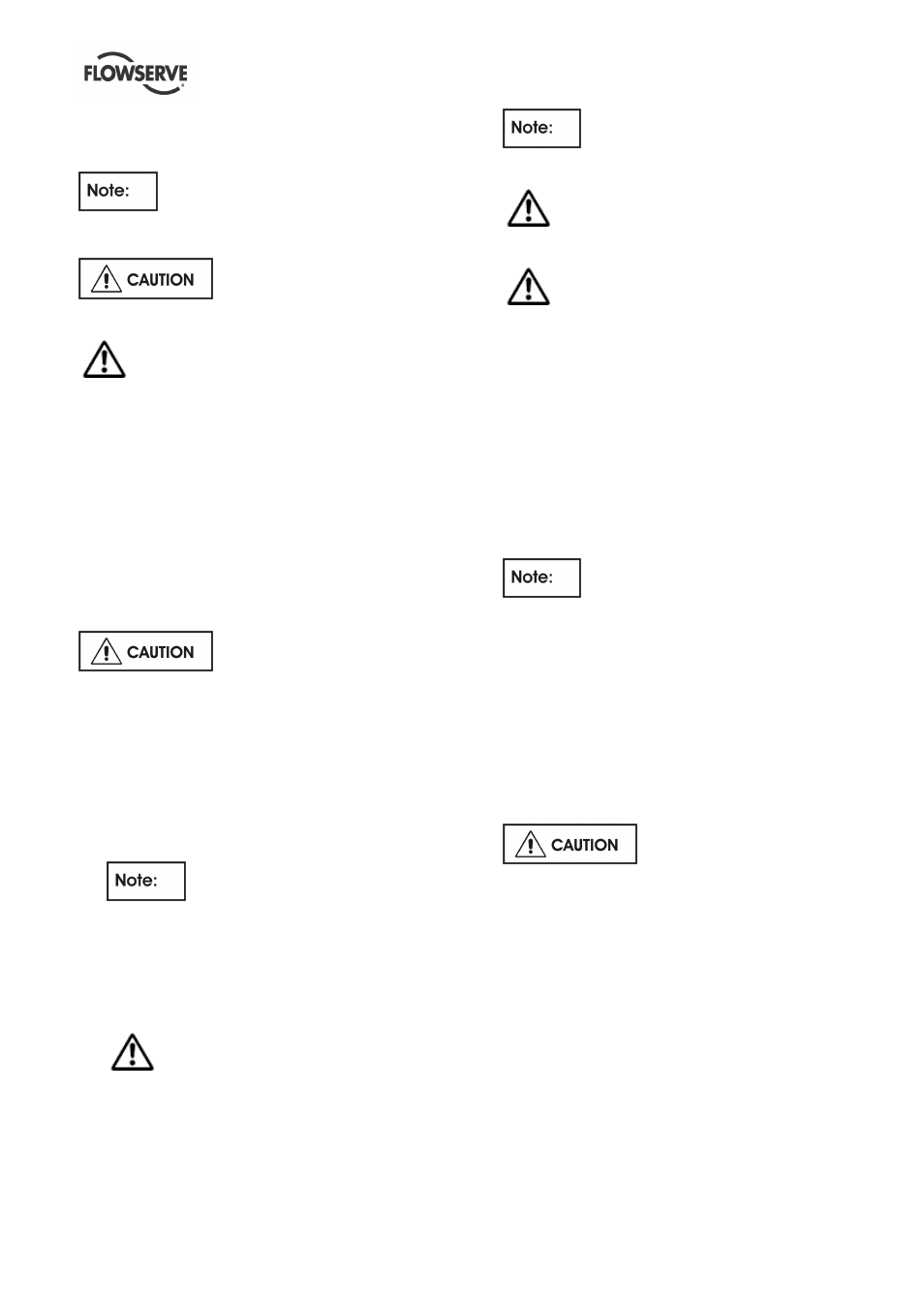3 impeller clearance, 4 direction of rotation, 5 guarding – Flowserve Worthington WXB User Manual
Page 26: 6 priming and auxiliary supplies, 7 starting the pump, 8 operation, 9 stopping and shutdown

WXB USER INSTRUCTIONS ENGLISH - 07/14
Page 26 of 51
5.3 Impeller clearance
No axial adjustment of the rotor is necessary.
The rotor is not moving during operation.
5.4 Direction of rotation
The sense of rotation of the
pump is clockwise (CW); looking from the coupling to
the shaft end of the pump.
The rotation of the driver shall be checked.
5.5 Guarding
Be sure that the coupling guard is mounted correctly
at the baseplate prior to start up.
5.6 Priming and auxiliary supplies
The pump must be completely primed prior to start
up.
a) The pump casing is considered as self venting,
so no vent connections are provided.
b) Auxiliary systems, e.g. barrier /buffer fluid
systems, cooling circuits, shall be filled according
to the user instructions.
Ensure that balance line is open.
Closed balance line leads immediately to a damage
of the pump. (This does not apply for opposed
impeller pumps). In case of an external balance line it
is recommended to install a pressure gauge right
after the pump. The measured pressure must not be
more than 2 bar (29 psi) above suction pressure.
5.7 Starting the pump
a) Start the driver according to the specification.
(Refer to driver IOM).
Pumps are usually started against
closed discharge valve.
b)
Check the discharge and suction pressure gauge
to verify the pumps delivered head. Open the
discharge valve slowly, until the pump reaches the
specified operation point. The pump must operate
smoothly, and the vibration must be below 3 mm/s
(0.12 in./sec) (API 610 vibration limits).
The discharge valve must be opened
within 30 sec. after start up. Longer operation
against closed discharge valve will damage the
pump. If a minimum flow valve is installed, take
pressure gauge readings to verify the correct
operation.
If the backpressure of the discharge
pipe is sufficient, pumps can be started against
open valve.
Ensure that your driver is capable deliver
the higher torque required by starting against
open valve.
To prevent the pump from reverse rotation
after shut down, the installation of a check valve
is recommended.
Although the pump is not affected by reverse
rotation because of special coupling design, it can
be an issue with the driver.
Check the discharge and suction pressure gauge
to verify the pumps delivered head.
The pump must operate smoothly, and the
vibration must be below 3 mm/s (0.12 in./sec) (API
610 vibration limits).
If a minimum flow valve is installed, take pressure
gauge readings to verify the correct operation.
c) Check the pipe system against any leakage.
d) Check the mechanical seal against any leakage.
Right after start up a minor leakage
of the mechanical seal is quite normal. Normally
this leakage disappears after few minutes of
operation.
5.8 Operation
a) Verify that the pump is operating within the
specified limits, min/max flow, pressure,
temperature, vibration, power
b) The bearing housing temperature shall not exceed
80 °C (176 °F). If higher bearing temperature are
observed, check the viscosity grade of the used
lubrication oil.
The minimum viscosity is 10
cSt at the expected oil temperature.
(Oil temperature = bearing gland temperature
+ 10 °C (50 °F))
c) From time to time check the pump shaft seal.
Leakage of 10 - 20 drops per hour is also with a
mechanical shaft seal unavoidable.
d) Observe the power consumption of the pump to
detect excessive wear.
5.9 Stopping and Shutdown
a) Close the outlet valve, but ensure that the pump
runs in this condition for no more than a few
seconds.
b) Stop the pump.
c) Switch off flushing and/or cooling/ heating liquid
supplies at a time appropriate to the process.
d) For prolonged shut-downs and especially when
ambient temperatures are likely to drop below
